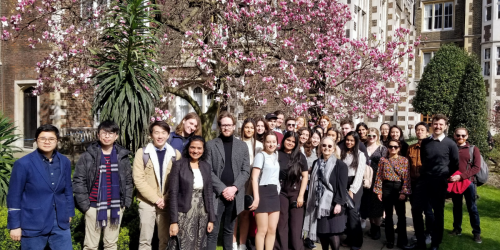
Lucy students visit Middle Temple
Lucy students were given an insight into the life of a barrister and a tour of Temple Church
Dr Poorna Mysoor will be teaching undergraduate students Land Law and Tort Law
Dr Mysoor moved to Cambridge from Oxford where she was a Leverhulme Trust Early Career Fellow at the Law Faculty and will take up her role at Lucy Cavendish from the 1st October.
Here she tells us all about her career, inspiration and why she chose Lucy Cavendish College.
My research focus is broadly the intersection of private law, such as land law, personal property law, tort law, contract law, and equity, with intellectual property, such as copyright, trademarks, patents and so on, and other intangibles. I received my DPhil from Oxford Law Faculty, where my research focus was the intersection of contract law and property law with the law of copyright. My undergraduate law degree is from the National Law School of India in Bangalore, and I have an LLM from SOAS, University of London.
My mother is a musician who is also my music guru. My father is a lawyer in India. Their work had an impact on me and I grew up wanting to pursue an area of law that brought both these together. Intellectual property law was the obvious choice – how does law see creativity and innovation, how does it regulate the marketplace for products of creativity and innovation? I qualified to practice in India, England and Wales, and Hong Kong. I practised intellectual property law for several years, which brought to fore certain normative questions of regulation. The importance of private law on regulation cannot be overstated. For me to investigate these questions I need the academic freedom and the rigour of a university environment. My husband supported me in changing my career from practice to the academy, and I embarked on my doctoral journey at Oxford. From then on, my research took a life of its own!
Intangibles including intellectual property make up a growing proportion of wealth in the global economy. As the technology evolves at an ever faster pace, not only do we have newer products which need regulation, but also newer ways of doing business and newer industries even! Non-fungible tokens, for example, have transformed an artist’s ecosystem and market access. Machine learning forces us to look at regulating the availability of training data. Optimality of regulation is key, to balance between creators, users and public at large. Historically, whenever technological challenges have arisen, say the printing press, the gramophone, telegraph, or radio, the law has responded to the challenges by drawing analogies with and inspiration from the existing principles, systems, and methodologies. The tools, principles, and values of private law have evolved and adapted to meet the governance needs of the day. Now is no different. I want to demonstrate how private law can be deployed to respond to the current and future technological challenges.
I was attracted first and foremost by the vision and ambition of Lucy Cavendish College in making its student population representative of the population in the UK by 2025. I have not come across such vision being put forward by any Oxford or Cambridge college thus far. This was the chief reason for me applying for this position. I see Lucy Cavendish College taking risks on students whom others may ignore and this is what sets Lucy apart. I want to be part of this monumental, and in many ways, historic effort to provide access to life-changing opportunities.
I will be the Director of Studies for undergraduate law students at Lucy, and will be teaching them Land Law and Tort Law. I would like to ensure that every student in my care is able to reach her or his potential to the fullest during their undergraduate years and grow as responsible individuals ready to contribute to the society, whatever be their chosen path.

Lucy students were given an insight into the life of a barrister and a tour of Temple Church

Maria talks about her new role and her plans to develop an inclusive and holistic well-being programme